#SallAllahu 'alaihi wa sallam
Text




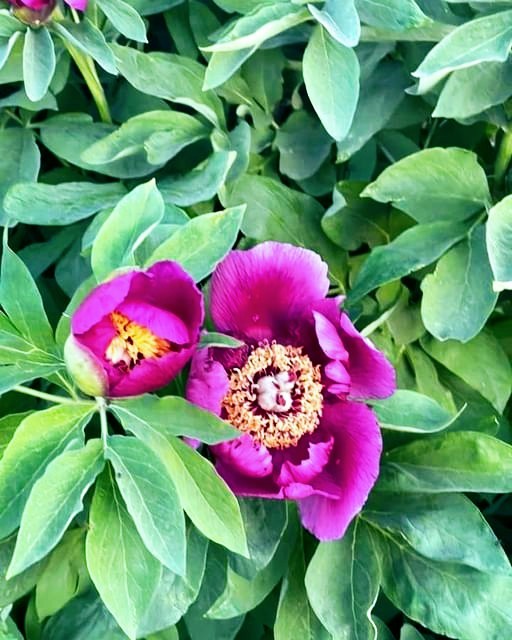
Kayseri, Türkiye 🇹🇷مرتفعات قيصري تركيا
#türkiye#doğa#manzara#travel photography#travel#travel destinations#view#natural#europe#africa#yokolmadan keşfet#çiçek#gül tükendi ben tükendim#gül🌹#sallallahu alaihi wa sallam#fotoğraf#beautiful pictures#amazing blog#discover turkey#Spotify
77 notes
·
View notes
Text
Daily Hadith
Bismillah Walhamdulillah Was Salaatu Was Salaam 'ala Rasulillah
Narrated 'Abdullah bin 'Amr (Radi-Allahu 'anhu):
A man asked the Prophet (Sallallahu 'Alaihi Wa Sallam), "What Islamic traits are the best?" The Prophet (Sallallahu 'Alaihi Wa Sallam) said, "Feeding the people, and greeting those whom you know and those whom you do not know."
Bukhari Vol. 8 : No. 253
#allah#god#islam#muslim#quran#ayat#hadith#revert#convert#convert islam#revert islam#revert help team#help#islamhelp#converthelp#prayer#salah#muslimah#reminder#pray#dua#hijab#religion#mohammad#new muslim#new revert#new convert#how to convert to islam#convert to islam#welcome to islam
48 notes
·
View notes
Text
✒ Grave: The First Stage Of Al-Akhirah
قال رسول الله صلى الله عليه وسلم : إن القبر أول منازل الآخرة ، فإن نجا منه فما بعده أيسر منه ، وإن لم ينج منه فما بعده أشد منه
The Messenger of Allah Sallallahu-‘Alaihi Wa Sallam said: “Verily, grave is the first of the stages of Afterlife, so if one is saved fom it (i.e its punishment) then nothing after that is easier than it, and if one is not saved from it then nothing after that is harder than it.”
● [مختصر صحيح الجامع الصغير ١٦٨٤ ، حسنه الألباني]
#islam#quote#allah#hijab#knowledge#inspirational quotes#islamicadvice#islam4 life#jilbab#la ilaha illa allah#islamicreminders#islamicart#islamicquotes#islamic#muslim revert#muslim#muslimah#muslim reminder#revert islam#revert#convert to islam#new convert#muslim convert
22 notes
·
View notes
Text

THREE STAGES TO TAHAJJUD
One of the most virtuous of the nawafil acts of worship is waking up in the middle of the night for tahajjud prayer. This is that special time when the doors of mercy are thrown open and the angels are dispersed, seeking out those in need of their Lord. Yet, how unfortunate our situation is that we are deprived from this great bounty.
“Their sides shun their beds in order to pray to their Lord in fear and hope…”(Quran, 32: 16)
Abu Hurayrah (radiallahu anhu) narrates that the Messenger of Allah (sallallahu alaihi wa sallam) said,“The best prayer after the obligatory prayers is the night prayer.” [Muslim]
I remember anytime one of the narrations regarding tahajjud would come up in a text, or was mentioned by one of our teachers, the students would eagerly ask how they could become regular in this blessed act. Here are a few suggestions based on their responses.
Stage 1 – I just can’t wake up
Despite your best efforts (asking a friend to call, multiple alarms, sleeping early, making a firm intention at night, etc.) if you simply cannot force yourself to get up, pray your tahajjud prayer before you go to sleep. Its time technically begins after Isha, so this can be a means of showing Allah that you are serious, and truly desirous of this great bounty. Couple this with dua admitting your inability and asking Allah for His bounty.
Stage 2 – I am sporadic in my tahajjud
If you are blessed to wake up for tahajjud on occasion, or get up most days, but miss a few here and there, be sure to “make-up” the prayer on the days that you don’t get up. And of course couple this with dua.
Umar (radiallahu anhu) narrates that“I heard the Messenger of Allah (sallallahu alaihi wa sallam) say, ‘Whenever one of you sleeps through his night devotions, or through a part of them, then, if you perform them between the Fajr (i.e after Ishraq) and Dhuhr prayer, you will receive the same reward as if you performed them at night.’” [Muslim]
Stage 3 – I regularly wake up for tahajjud
Alhamdulillah, if you are at this stage you need to ensure 3 things:
Give shukr every night that Allah allowed you take advantage of this great blessing.
Admit to Allah that while you are unworthy of such a blessing, you are in need of it.
Beg Allah that He allow you to wake up the following night as well.
May Allah, Most High, allow each of us to be regular in our tahajjud prayers!
Ismail Ahmed
#islam#quran#islamic#muslim#islamicquotes#pakistan#islamic group#muslim community#muslim countries#istanbul#tahujjud#islamicpost#islamicreminder#hadith#muslim ummah#makkah#allah#muslimah#jannah#alhamdulillah#prophetmuhammad#allahuakbar#salah#prayer#deen
44 notes
·
View notes
Text
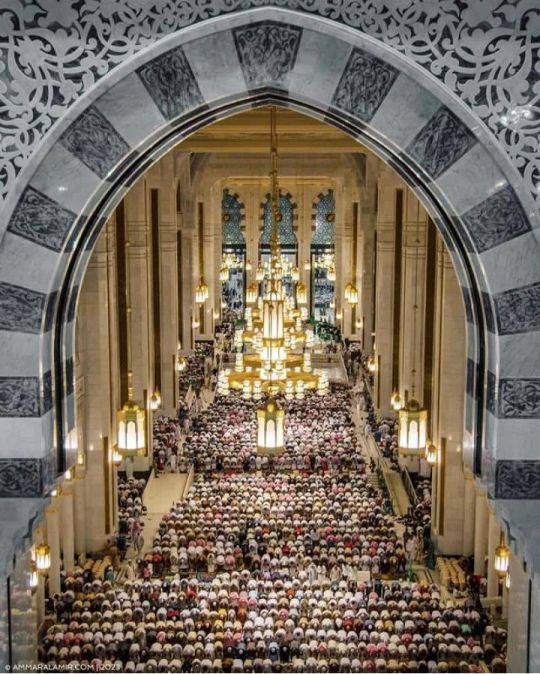
Bismillah Walhamdulillah Was Salaatu Was Salaam ‘ala Rasulillah Narrated Abu Huraira (Radi-Allahu 'anhu):
The Prophet (Sallallahu 'Alaihi Wa Sallam) said, “If Allah loves a person, He calls Gabriel ('Alaihis-Salam) saying, 'Allah loves so and-so; O Gabriel! Love him.’ Gabriel ('Alaihis-Salam) would love him and make an announcement amongst the inhabitants of the Heaven. 'Allah loves so-and-so, therefore you should love him also,’ and so all the inhabitants of the Heaven would love him, and then he is granted the pleasure of the people on the earth.”
Bukhari Vol. 4 : No. 431
10 notes
·
View notes
Text
Powerful Tips for the Last 10 Nights of Ramadan
1. Do not let your ‘performance’ until now affect your last 10 days. The moment of forgiveness could be today or anytime in the coming days! It is not all lost! If you sincerely wish it could have been better - Chin up and get ready to make it your best yet! Start with a positive, sincere intention!
2. Today, take a little time to read the Tafseer of Surah al-Qadr to understand what actually happens this night! You will feel its power & greatness so much more!
3. Do not wait for the 27th Night to give it your “all". The entire last 10 days should be your target. Stay up each night! Would you want to miss Laylatul Qadr even “by chance"?
4. Do not fall into any innovations/celebrations any masjid or culture might try to promote. Follow the Sunnah! The Prophet (sallAllahu ‘alaihi wa sallam) guided us simply: “Whoever stays up and prays on Laylat al-Qadr out of faith and in the hope of reward, his previous sins will be forgiven.”
5. Memorize and keep asking the dua’ taught by Rasulullah (sallAllahu ‘alaihi wa sallam): Allaahumma innaka ‘afuwwun tuhibb al-‘afwa fa’affu ‘anni (O Allaah, You are forgiving and You love forgiveness, so forgive me).
6. Prepare a short dua’ list. Remember this is as awesome as it ever gets for a servant of Allah! The Night of Qadr, of Destiny! Consciously pick each and everything you crucially wish for in this dunya, in your deen, family, and in your aakhirah! Don’t forget to include the brothers and sisters around the world who are suffering and in grief!
7. Take brief naps during the day, if possible. Keep your stomach light and sleep as soon as you have prayed ‘isha. Do not delay! After a brief nap, refresh yourself and get ready for worship.
8. Don’t neglect your family! Rasulullah made it a point to wake up his wives throughout these nights! And yes, your children are not too young to stay up some part of the night - if they can be allowed to play video games or watch TV, they can be inspired to be up atleast for sometime! Prepare them, make them excited, plan some activities for them to do!
9. Look the Part: The way we dress and prepare has a big effect on our psychology. Wear your best, perfume yourself, and feel the energy!
10. Choose a spot, whether in the Masjid or in your home, where you can have peace and solitude. Keep your mushaf, praying mat, and water at hand so that you are not distracted by constantly getting up for this or that.
11. IMP: This is not the night to tweet pics or update FB statuses about how amazing the night is and how you are feeling & worshipping Allah! Let that be a secret between you & your Rabb! So switch off those phones, wifi, laptops and computers. Disconnect with the world, and connect with al-‘Afuww!
12. If you find yourself feeling sleepy, vary your acts of worship. Alternate between qiyaam, heartfelt dua’a, reading the Qur’an. Do not spend the night listening to lectures or recitations. Or do it only for a short while when you feel the sleep coming on!
13. Patience is the Key: The last 10 days might be tiring. You might still have work or school. This is the time to bear all that hardship, and keep firm sabr. Think how Allah has blessed you with this tremendous opportunity that might NEVER come again in your life again. If you knew for sure that this was your last day, if you knew certainly that Jannah was up for grabs, wouldn’t you sprint for it no matter what it takes?
14. This is most important: Keep husn adh-dhann bi Allah (good expectations from Allah). When you ask, remember you are asking the Most Generous King. If you hope for the best, He will give you the best. Don’t hold back. Trust in Him, pour out your heart in front of Him, and let no doubt, no barrier, no evil thoughts keep you away from ar-Rahman, ar-Raheem!
(From: Tawfique Chowdhury)
3 notes
·
View notes
Text
SALAAT-UL-HAAJAT:
The Prayer of Need Du’a and How to Perform Salaat-ul-Haajat
Salaatul Haajat, also written as Salaatul Haajat, is the prayer of need. It is usually recited to Allah to help those with some pressing needs. This prayer helps in improving the spiritual well-being, mental health and physical health of a person.
Reciting this prayer on time ensures that one is guided by Allah Subhanahu wa Ta’ala
What is the meaning of Salatul Hajat?
The literal meaning of the word Haajat is to wish. Salaatul Haajat has 2 rakats prayers that are offered to Allah Subhanahu wa Ta’ala
What is the purpose of Salaatul Haajat?
The purpose of Salaatul Haajat is that emphasize your prayer and ensure that it goes to heaven, known as jannah in Islam, the best creation of Allah Subhanahu wa Ta’ala.
What is the best time to pray Salatul Hajat?
This Salaat can be performed any time of the day, however the best prescribed time for this dua is during the final third part of the night. It is generally considered as a du’a to be said after the Witr namaz.
Salaatul Haajat Du’a
The du’a that is said in Salaatul Haajat is a salat for need. Regarding Salaatul Haajat du’a, Abdullah ibn Abi Awfa narrates:
The Messenger of Allah said, “Whoever has a need with Allah Subhanahu wa Ta’ala, or with any human being, then let them perform ritual ablutions and then pray two rakats. After that, let them praise Allah Subhanahu wa Ta’ala and send blessings (Durood) on the Prophet (peace and blessings be upon him)The dua in Arabic with pronunciation guide:
لا إِلَهَ إلاَّ اللهُ الحَلِيمُ الكَرِيمُ، سُبْحَانَ اللهِ رَبِّ الْعَرْشِ العَظِيمِ ، الحَمْدُ لِلهِ رَبِّ العَالَمِيْنَ ، أَسْأَلُكَ مُوجِبَاتِ رَحْمَتِكَ ، وَعَزَائِمَ مَغْفِرَتِكَ ، وَالْغَنِيمَةَ مِنْ كُلِّ بِرّ،ٍ وَالسَّلامَةَ مِنْ كُلِّ إِثْمٍ ،لاَ تَدَعْ لِيْ ذَنْباً إِلاَّ غَفَرْتَهُ، وَلاَ هَمَّاً إِلاَّ فَرَّجْتَهُ، وَلاَ حَاجَةً هِيَ لَكَ رِضاً إِلاَّ قَضَيتَهَا يَا أَرْحَمَ الرَّاحِمِيْنَ
Laaa ilaaha illallaa-hul-Haleemul Kareem.
Subhaanallahi Rabbil `Arshil `Azeem.
Wal-Hamdu-lillaahi Rabbil-`Alameen.
As’aluka mujeebati rahmatik, wa `azaaa‘ima maghfiratik, wal ghaneemata min kulli birr, wassalaamata min kulli ithm.
Laa tada` lee dhanban illaa ghafartah, walaa hamman illaa farraj-tah, walaa daynan illa qadaytah, walaa haajatam-minha-waijid-dunyaa wal-aaakhirah, heya laka ridan illaa qadaytahaa yaaa ar-hamar-Raahemeen. Ameen, Thumma Ameen Ya Rabbil’Alameen.
Translation of Salaatul Haajat Du’a
There is no god but Allah the Clement and Wise. There is no god but Allah the High and Mighty. Glory be to Allah, Lord of Tremendous Throne. All praise is to Allah, Lord of the worlds. I ask you (O. Allah) everything that leads to your mercy, and your tremendous forgiveness, enrichment in all good, and freedom from all sin. Do not leave a sin of mine (O. Allah), except that you forgive it, nor any concern except that you create for it an opening, nor any need in which there is your good pleasure except that you fulfill it, O. Most Merciful!
The meaning of this du’a in the words of Abu Dawood is, “Whenever a matter became serious, the Prophet (SallAllahu ’alaihi wa Sallam) turned to salah.”
It means that one can plead to God at any time asking for help, for Allah Subhanahu wa Ta’ala is the most merciful and beneficent. Among all voluntary appeals to Allah Subhanahu wa Ta’ala, there is also one important prayer, which is called Salaatul Haajat.
It is observed for the purpose of completion of one’s particular Haajah (need). It is but one of the ways to pray to the Almighty for one’s rightful wish.
“He who makes wudhu, and does it properly, then prays two rak’ats, Allah Subhanahu wa Ta’ala will grant him whatever he may pray for, sooner or later” (Ahmad)
Salaatul Haajat for Marriage
Salaat ul Haajat for marriage gives best results if recited on a Monday. After completing the Isha prayer, one must perform ablution or purification bath, and then proceed to a private space to offer the prayer.
Start by offering a 4 rakah prayer with one salaam. Also, say the intention (Niyyah)of the prayer at this time.
In the first rakah, recite Surah al-Fatihah, followed by Surah Ikhlas, a total of ten times. In second rakah, recited the same surahs 20 times. In the third rakah, say the same surahs 30 times. And finally in the 4 rakah, both surah should be recited 40 times.
Perform salaam, and silently move on to the next step.
Recite Surah Ikhlas 75 times. Then recite Istaghfaar 75 times. And finally, recite Darood Shareef 75 times.
Finally, offer your du’a for marriage.
Repeat every Monday for faster results.
How to perform Salaatul-Haajat?
For performing these prayers or namaz, there is a particular format that has to be followed. Here’s a quick guide on how to pray Salaatul-Haajat.
The person performing Salaat-ul-Haajat has to start making a Wudhu. Wudhu is a cleansing ritual that is performed as an important part of purity and cleanliness in Islam.
After this two rakats are performed with an intention of Nafl Salaat.
After the salaat is completed, the reciting of prayer to Allah Subhanahu wa Ta’ala and Durood Shareef starts. It is considered good to recite as much amount of Tasbeeh and Durood Shareef in Islam.
Once this all is done in the end, making a keen Du’a e Haajat is compulsory. This helps in the fulfillment of one’s requirement or obscurity.
Salaatul-Haajat Benefits
Salaat-ul-Haajat rewards or benefits cannot be explicitly mentioned as they come from the purpose of the prayer. It is a prayer of the need and the rewards with benefits as per one’s need and wishes.
It is a powerful salaat and must be performed with a pure heart and complete surrender to the Almighty. When said with honest intentions, this prayer is sure to fulfill all wishes and fetch miraculous rewards from Allah Subhanahu wa Ta’ala, the most merciful.
It is a prayer basically recited for wishes or the fulfillment of any specific purpose.
________
2 notes
·
View notes
Text
Hasad (jealousy and envy) is among the most destructive emotions or feeling which a man may have towards his fellow human being. It causes him to wish evil for others and to be happy when misfortune befalls them. The Prophet (sallallahu alaihi wa-sallam) warned against envy by comparing it to fire that completely burns the wood.
He (sallallahu alaihi wa-sallam) said: “Beware of jealousy, for verily it destroys good deeds the way fire destroys wood.” [Abu Dawood]
7 notes
·
View notes
Text
Can you have anything you want in Jannah?
Abdullah ibn Mas‘ood (RadiyAllahu Anhu), according to which the Messenger of Allah (SallAllahu Alaihi Wa Sallam) said:
"I have seen the very last person to get out of hell and enter into Jannah."
This is the person who has the very least faith, an atom's worth of faith in his heart. And Allah swt takes him out at the very end from Jahannam to enter into paradise. Yet look, how Allah swt is going to treat this man.
The Prophet SAW said, he comes crawling out entirely scorched, and he looks back at hellfire and says, "Alhamdu lillah, I am done with you." Then Allah swt tells him, "Go ahead and enter into the garden of paradise." So, he goes and enters into the garden of paradise and he finds that people have occupied their homes. So imagine he goes through the neighborhoods of Jannah and he says, I dont see anything. It looks like all the houses are occupied. So he comes back to Allah swt and says, "Ya Rabb, the people have taken all of the homes, what do I do?" And Allah swt says to him, "Do you even remember the time that you were in?" Like, do you have any recollection of time, do you know where you are? Do you know how long you were in hellfire? Do you remember your existence in dunya before going to Jahannum for all of those years?
He says, "Yes." So, Allah swt says to him: "Tamanna. Make a wish."
So, he's going to think and say, "I wish for something and for the entire kingdom of the world," meaning everything that existed of Mulk, of kingdom that this dunya ever possessed, everything from Suleiman AS's kingdom, Dawood AS's kingdom to Firaun and Qaroon, I want it all to be given to me."
Allah swt says to him, You can have what you wished for - and you have the whole world ten times over."
So, this man just got out of hellfire, has very little belief in his heart, he is the last person to go into Jannah, he couldnt even find a house for himself in Jannah but when he makes a wish Allah swt says, you get what you wish and I'm gonna give you the whole world times ten, everything that existed in this world times ten.
If Allah, in His infinite power, can grant someone the entire world and even ten times more than that for having just an atom's worth of faith in their heart, then imagine the boundless blessings that await the believers in Jannah (Paradise). In Jannah, we will have the fulfillment of all our desires, exactly as we wish, because Allah, the Most Merciful and All-Powerful, has complete control over everything. It is a testament to His unimaginable generosity and love for His believers, and a reminder of the limitless rewards that await those who hold steadfast to their faith in Allah.
2 notes
·
View notes
Text








#hakkari#hasankeyf#batman#tuz mağarası#ığdır#arizona#america#Türkiye#hazreti Muhammed#sallallahu aleyhi ve sellem#prophet muhammad#sallallahu alaihi wa sallam#صلى الله عليه وسلم#تركيا#أريزونا أمريكا
30 notes
·
View notes
Text
[Bagian 1] Zikir dan Iman
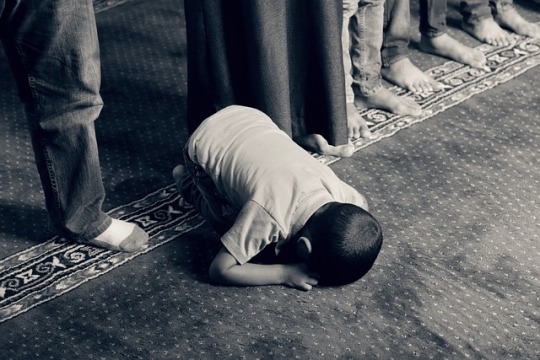
Saya tiba-tiba teringat dengan hadis sahih riwayat Bukhari dan Muslim dimana Sayyidah Fatimah meminta pembantu pada ayahnya baginda Nabi sallallahu alaihi wa sallam agar pekerjaan-pekerjaan rumahnya menjadi ringan. Tapi, nabi menolak. Kemudian beliau bilang,
أدلك على ما هو أفضل من خادم: تسبحين الله عند النوم ثلاثا وثلاثين، وتحمدين الله عند النوم ثلاثا وثلاثين، وتكبيرينه عند النوم أربعا وثلاثين، فهذا خير لك من خادم
Sebagai gantinya, Nabi sallallahu alaihi wa sallam menyuruh Sayidah Fatimah untuk berzikir sebelum tidur. Setelah mengamalkannya, Sayidah Fatimah tak lagi merasakan letih.
Kita (atau saya saja) pasti bertanya-tanya, masalah yang dihadapi Sayidah Fatimah adalah masalah pekerjaan ('amaliy). Tapi, solusi yang diberikan Nabi malah solusi yang tak ada kaitannya dengan pekerjaan. Bagaimana mungkin hanya dengan menggerakkan mulut rasa letih setelah kerja seharian bisa hilang? Kita mungkin bisa mengerti kalau misalnya Nabi menyarankan agar merutinkan olahraga atau konsumsi makanan tertentu agar stamina tubuh bertambah. Ini kenapa malah zikir?
Setelah sedikit merenung, saya sadar kalau zikir itu bukan sekedar menggerakkan mulut. Tasbih, tahmid, takbir, tahlil, istirja', hauqolah, dan semua zikir punya makna. Dan makna itu adalah makna iman. Imanlah yang memberikan energi.
Iman letaknya di hati. Pemilik iman dalam sejarah selalu menciptakan peristiwa-peristiwa hebat. Seperti kisah peperangan antara pasukan Thalut dan Jalut di Surat Al-Baqarah,
فَلَمَّا جَاوَزَهُۥ هُوَ وَٱلَّذِینَ ءَامَنُوا۟ مَعَهُۥ قَالُوا۟ لَا طَاقَةَ لَنَا ٱلۡیَوۡمَ بِجَالُوتَ وَجُنُودِهِۦۚ قَالَ ٱلَّذِینَ یَظُنُّونَ أَنَّهُم مُّلَـٰقُوا۟ ٱللَّهِ كَم مِّن فِئَةࣲ قَلِیلَةٍ غَلَبَتۡ فِئَةࣰ كَثِیرَةَۢ بِإِذۡنِ ٱللَّهِۗ وَٱللَّهُ مَعَ ٱلصَّـٰبِرِینَ
Walau dari segi logistik pasukan Thalut lemah, tapi kekuatan iman menjadikan mereka kuat. Pasukan Thalut berhasil mengalahkan pasukan Jalut.
Keimanan memberikan suntikan energi pada pemiliknya. Pemilik iman kuat walau secara materi terlihat kurang.
Sedangkan orang yang tak hidup dalam hatinya makna-makna iman akan merasakan kesempitan dan pesimisme dalam hidup. Walau ia kaya secara materi. Dalam Sunan At-Tirmdzi, Nabi sallallahu alaihi wa sallam bersabda,
من كانتِ الآخرةُ هَمَّهُ جعلَ اللَّهُ غناهُ في قلبِهِ وجمعَ لَه شملَهُ وأتتهُ الدُّنيا وَهيَ راغمةٌ ، ومن كانتِ الدُّنيا همَّهُ جعلَ اللَّهُ فقرَهُ بينَ عينيهِ وفرَّقَ عليهِ شملَهُ ، ولم يأتِهِ منَ الدُّنيا إلَّا ما قُدِّرَ لَهُ
Dalam Surat Taha,
وَمَنۡ أَعۡرَضَ عَن ذِكۡرِی فَإِنَّ لَهُۥ مَعِیشَةࣰ ضَنكࣰا وَنَحۡشُرُهُۥ یَوۡمَ ٱلۡقِیَـٰمَةِ أَعۡمَىٰ
Dalam banyak ayat disebut salah satu ciri khas org kafir adalah pesimisme. Di Surat Yusuf,
إِنَّهُۥ لَا یَا۟یۡـَٔسُ مِن رَّوۡحِ ٱللَّهِ إِلَّا ٱلۡقَوۡمُ ٱلۡكَـٰفِرُونَ
Kekuatan Iman yang membuat Nabi Ibrahim berani dilempar ke dalam Api. Kekuatan iman yang membuat Baginda Nabi sallallahu alaihi wa sallam dan para sahabat bertahan di tengah siksaan bertahun-tahun lamanya di Makkah. Kekuatan iman juga yang membuat seorang Bilal bin Rabah bertahan di bawah terik matahari, di atas pasir panas, dan di bawah himpitan batu.
Kalau pengaruh iman sebesar ini, lalu bagaimana untuk hal sekedar pekerjaan rumah?
Baginda Nabi sallallahu alaihi wa sallam ketika menyuruh Sayidah Fatimah berzikir, sebenarnya beliau bukan tak memberikan solusi. Beliau memberikan solusi yaitu solusi kejiwaan.
[Bagian 2] Keimanan Adalah Energi Terbesar Umat Islam
Semakin hari saya semakin yakin bahwa keimanan adalah energi terbesar umat. Dan energi ini tak dimiliki umat-umat lain.
Setiap orang dari berbagai etnis, ras, dan agama bisa menjadi kaya raya, terkenal, pakar di bidang tertentu, dan meraih kesuksesan materi lainnya. Tapi, satu hal yang membedakan seorang muslim sukses dan seorang non muslim sukses adalah keimanan.
Seorang muslim punya tujuan yang melampaui hal-hal materi. Karena ia beriman pada Allah dan akhirat.
Seorang muslim ketika mengalami kegagalan ia takkan tenggelam dalam kesedihan. Karena ia beriman dengan qada dan qadar.
Seorang muslim ketika ia tak mendapat pujian atau apresiasi atas pekerjaannya ia tak perlu risau. Karena ia bekerja karena Allah. Ada pujian atau tidak itu semua tak mempengaruhi kerjanya.
Kemudian makna-makna iman tadi selalu dicas dengan salat. Sebanyak lima kali sehari semalam seorang muslim diingatkan akan Rab-nya.
Ketika ia mengucapkan takbiratulihram, ia diingatkan bahwa Rabb-nya Maha Besar dari apapun.
Ketika ia membaca surat Al-Fatihah ia diingatkan bahwa setelah kehidupan dunia ada kehidupan akhirat. Ia juga diingatkan bahwa tak ada yang layak dijadikan tempat bergantung dan pertolongan selain-Nya.
Ketika membaca dua kalimat syahadat ia dingatkan lagi dengan identitasnya sebagai seorang muslim pengikut risalah Nabi terakhir Muhammad sallallahu alaihi wa sallam.
Salat itu punya tujuan yang sama dengan zikir. Dalam Surat Taha,
إِنَّنِیۤ أَنَا ٱللَّهُ لَاۤ إِلَـٰهَ إِلَّاۤ أَنَا۠ فَٱعۡبُدۡنِی وَأَقِمِ ٱلصَّلَوٰةَ لِذِكۡرِیۤ
Seandainya seorang muslim memahami bacaan-bacaan salatnya, maka itu sudah cukup untuk jadi bekal imannya seharian.
Terkahir, setiap ritual yang disyariatkan dalam islam (salat, zikir, haji, dll) mewujudkan makna iman dan ubudiyah dalam diri manusia. Kemudian dalam bingkai iman dan ubudiyah tadi manusia merealisasikan tujuan utama penciptaanya yaitu memakmurkan bumi. Seperti yang diistilahkan oleh Dr. Abdul Majid An-Najjar: khilafat al ard ala minhaj al ubudiyyah. Dalam Surat Al-Anbiya,
وَلَقَدۡ كَتَبۡنَا فِی ٱلزَّبُورِ مِنۢ بَعۡدِ ٱلذِّكۡرِ أَنَّ ٱلۡأَرۡضَ یَرِثُهَا عِبَادِیَ ٱلصَّـٰلِحُونَ
"Dan sungguh, telah Kami tulis di dalam Zabur setelah (tertulis) di dalam Aż-Żikr (Lauḥ Maḥfūẓ), bahwa bumi ini akan diwarisi oleh hamba-hamba-Ku yang salih."
Kairo, 2 Desember 2022
#filsuf#nulisyuk#mahasiswa#catatanharianmahasiswa#catatanharian#azhar#intelektual#akademisi#salat#keimanan#islam#maknasalat#khilafah#manusia
4 notes
·
View notes
Text
Daily Hadith
Bismillah Walhamdulillah Was Salaatu Was Salaam 'ala Rasulillah
Narrated 'Abdullah (Radi-Allahu 'anhu):
The Prophet (Sallallahu 'Alaihi Wa Sallam) said, "When you are three persons sitting together, then no two of you should hold secret counsel excluding the third person until you are with some other people too, for that would grieve him."
Bukhari Vol. 8 : No. 305
#allah#god#islam#muslim#quran#ayat#hadith#revert#convert#convert islam#revert islam#revert help team#help#islamhelp#converthelp#prayer#salah#muslimah#reminder#pray#dua#hijab#religion#mohammad#new muslim#new revert#new convert#how to convert to islam#convert to islam#welcome to islam
29 notes
·
View notes
Text
✒ Be The Key To Goodness And Not Evil 🗝
The Messenger of Allah Sallallahu-‘Alaihi Wa Sallam said:
“Indeed, from amongst mankind are those who are KEYS to GOODNESS (and) LOCKS to EVIL and indeed from amongst mankind are those who are KEYS to EVIL (and) LOCKS to GOODNESS, so GLAD-TIDING to the one for whom Allah has placed the keys of goodness in his hands and WOE to the one for whom Allah has placed the keys of evil in his hands.”
● [مختصر صحيح الجامع الصغير ٢٢٢٣ ، قال الشيخ الألباني : الحديث بمجموع طرقه حسن]
#islam#quote#allah#hijab#knowledge#inspirational quotes#islamicadvice#islam4 life#jilbab#la ilaha illa allah#islamicreminders#islamicart#islamicquotes#islamic#muslim revert#muslim reminder#muslimah#muslim#hadith
19 notes
·
View notes
Text
How to perform nafil salats
Tahajjud :
The actual time for Tahajjud Salah is after one wakes up from his/her sleep and the most virtuous time is towards the latter portion of the night. [1] However if one is not able to awaken for the performance of Tahajjud Salah, then he/she should perform Nafl Salah before sleeping.
Ishraq :
The time for Salat al-Ishraq extends from after sunrise (approximately 15 min. after sunrise) and ends before midday when the sun reaches its zenith. However, it is best to perform Salat al-Ishraq early when its time sets in.
Dhuha (Chast) :
Similarly, the time for Salat al-Dhuha extends from after sunrise (approximately 15 min. after sunrise) and ends before midday when the sun reaches its zenith. [2] However, based on a narration of Rasulullah Sallallahu Alaihi Wa Sallam, the best time to perform Salat al-Dhuha is after one-fourth of the day expires. In other words, the day stretches from sunrise to sunset. After dividing this period into four parts, the best time for Dhuha would be after the first part terminates.
Awwabin :
The time for Salat al-Awwabin is after the performance of Maghrib Salah. Salat al-Awwabin, which literally means the salah of those who turn to Allah alone, is commonly used to refer to the six supererogatory rak’ahs that are prayed after Maghrib. However, in an authentic hadith, the term salat al-awwabin refers to salat al-duha: the pre noon prayer. In one hadith it is mentioned that the blessed Prophet (may peace and salutations be upon him) went to the people of Quba when they were praying Salat al-Duha. He said, “Salat al-awwabin is to be offered at the time when a young camel’s hooves are scorched.” This hadith indicates that salat al-awwabin is the salah which is offered prior to noon [Salat al-Duha].
Nevertheless, there is no harm in referring to the six supererogatory rak’ahs after Maghrib as Salat al-Awwabin in terms of its meaning [the salah of those who turn to Allah alone]. The hadith of Tirmidhi narrates the virtue of Salat al-Awwabin. Abu Huraira (May Allah be pleased with him) reports that Rasulullah (may peace and salutations be upon him) said, "Whosoever offers six rak’ahs after Maghrib and does not speak of any evil within that time, he will receive the reward of twelve years of worship."
The Prophet said:
“Whoever offers a prayer between the evening and late-night prayer, it is called the awabeen prayer.” (Ibn Mubarak, el-Raqaik).
The hadith simply states that one must offer six rak'ahs of salah to attain the said reward. Some scholars hold the opinion that the two sunnahs are included in these six while others say that they are excluded. Therefore, one should try to offer six rak'ahs after the two sunnahs, but if only four are offered, it will suffice.
How to Offer Salat al Awwabin (Prayer of the Oft- Repentant)
1. Rekat
First make the Niyyah (intention) by reciting "I intend to perform six rakats of the salat al Awwabin"
How to perform salat al Awwabin
You say takbir "Allahu Akbar" This starts the prayer.
Begin reciting "Subhanaka"
After you say: "Audhu billahi min-ash-shayta -nir-rajeem Bismillah-ir-Rahman-ir-raheem"
Reciting Surah Al-Fatiha
Another portion (Surah) of the Qur'an.
Go into Ruku (the bowing position) and You say "Subahaana Rabbiyal Azeem"
Stand up straight when you says "Sami Allahu liman Hamidah", and say "Rabbana lakal Hamd" in a low voice.
Go into the 1st Sajdah and You say "Subahaana Rabbiyal Aa'la"
Now sit-up from the first Sajdah in jalsa position (Sitting position between the two Sajdahs)
Now go into the 2nd Sajdah and You say "Subahaana Rabbiyal Aa'la"
2. Rakat
Rise up to proceed to the next raka'at,
You say "Bismillah-ir-Rahman-ir-raheem"
Reciting Surah Al-Fatiha
Another portion (Surah) of the Qur'an.
Go into Ruku (the bowing position) and You say "Subahaana Rabbiyal Azeem"
Stand up straight when you says "Sami Allahu liman Hamidah", and say "Rabbana lakal Hamd" in a low voice.
Go into the 1st Sajdah and You say "Subahaana Rabbiyal Aa'la"
Now sit-up from the first Sajdah in jalsa position (Sitting position between the two Sajdahs)
Now go into the 2nd Sajdah and You say "Subahaana Rabbiyal Aa'la"
After this, you sit for Tashshahud: You recite just At-tahiyyat
3. Rakat
Rise up to proceed to the next raka'at,
You say "Bismillah-ir-Rahman-ir-raheem"
Reciting Surah Al-Fatiha
Another portion (Surah) of the Qur'an.
Go into Ruku (the bowing position) and You say "Subahaana Rabbiyal Azeem"
Stand up straight when you says "Sami Allahu liman Hamidah", and say "Rabbana lakal Hamd" in a low voice.
Go into the 1st Sajdah and You say "Subahaana Rabbiyal Aa'la"
Now sit-up from the first Sajdah in jalsa position (Sitting position between the two Sajdahs)
Now go into the 2nd Sajdah and You say "Subahaana Rabbiyal Aa'la"
4. Rakat
Rise up to proceed to the next raka'at,
You say "Bismillah-ir-Rahman-ir-raheem"
Reciting Surah Al-Fatiha
Another portion (Surah) of the Qur'an.
Go into Ruku (the bowing position) and You say "Subahaana Rabbiyal Azeem"
Stand up straight when you says "Sami Allahu liman Hamidah", and say "Rabbana lakal Hamd" in a low voice.
Go into the 1st Sajdah and You say "Subahaana Rabbiyal Aa'la"
Now sit-up from the first Sajdah in jalsa position (Sitting position between the two Sajdahs)
Now go into the 2nd Sajdah and You say "Subahaana Rabbiyal Aa'la"
After this, you sit for Tashshahud: You recite just At-tahiyyat
5. Rakat
Rise up to proceed to the next raka'at,
You say "Bismillah-ir-Rahman-ir-raheem"
Reciting Surah Al-Fatiha
Another portion (Surah) of the Qur'an.
Go into Ruku (the bowing position) and You say "Subahaana Rabbiyal Azeem"
Stand up straight when you says "Sami Allahu liman Hamidah", and say "Rabbana lakal Hamd" in a low voice.
Go into the 1st Sajdah and You say "Subahaana Rabbiyal Aa'la"
Now sit-up from the first Sajdah in jalsa position (Sitting position between the two Sajdahs)
Now go into the 2nd Sajdah and You say "Subahaana Rabbiyal Aa'la"
6. Rakat
Rise up to proceed to the next raka'at,
You say "Bismillah-ir-Rahman-ir-raheem"
Reciting Surah Al-Fatiha
Another portion (Surah) of the Qur'an.
Go into Ruku (the bowing position) and You say "Subahaana Rabbiyal Azeem"
Stand up straight when you says "Sami Allahu liman Hamidah", and say "Rabbana lakal Hamd" in a low voice.
Go into the 1st Sajdah and You say "Subahaana Rabbiyal Aa'la"
Now sit-up from the first Sajdah in jalsa position (Sitting position between the two Sajdahs)
Now go into the 2nd Sajdah and You say "Subahaana Rabbiyal Aa'la"
After this, you sit for the complete Tashshahud: You recite At-tahiyyat, Allah-umma salli, Allah-umma Barik and Rabbana.
Turning to your face to the right first and saying "Assalamu alaikum wa Rahmatullah" and then to his left and doing the same
#awwabin#islam#quran#islamic#muslim#islamicquotes#pakistan#islamic group#muslim community#muslim countries#istanbul#islamicpost#islamicreminder#hadith#muslim ummah#makkah#muslimah#alhamdulillah#allah#jannah#instagram
7 notes
·
View notes
Text
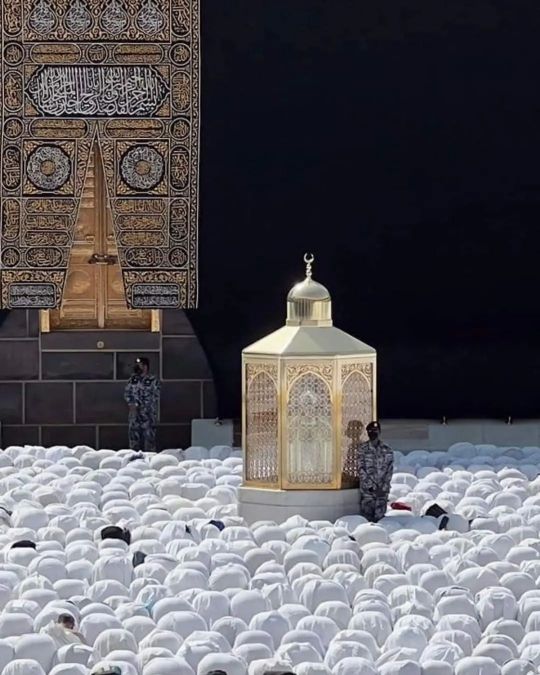
Bismillah Walhamdulillah Was Salaatu Was Salaam 'ala Rasulillah
Narrated Abu Huraira (Radi-Allahu 'anhu): Allah's Apostle (Sallallahu 'Alaihi Wa Sallam) said, "The riding one should greet the walking one, and the walking one should greet the sitting one, and the small number of persons should greet the large number of persons."
Bukhari Vol. 8 : No. 251
8 notes
·
View notes
Text
3RD RAMADAN
தமிழில்
The demise of the Queen of Paradise, Umm al-Momineen Fatima az-Zahra RadiAllahu Anha
Blessed be that symbol of honor; Pious Batool, our Prophetﷺ’s daughter,
Blessed be the veils of graces; Which from sun and moon hid their faces,
Blessed be our Prophet’s beloved daughter; Pious, pure and women’s leader.
Sayyidah Fatimah az-Zahra Radi Allahu Ta’ala Anha was the fourth daughter of the Holy Prophet ﷺ and Sayyidah Khadija Radi Allahu Ta’ala Anha. “Zahra” (having gleaming and luminous face), “Batool” (aloof from the worldly pleasures) are “Tahira” (chaste and modest) are among her exalted titles.
Umar bin Khattab (RadiAllahu Anhu) says that he went to the house of Fatimah (RadiAllahu Anha) the daughter of the Messenger of Allah ﷺ and said, “Oh Fatimah! I swear by Allah that I have not seen anyone who is dearer to the Messenger of Allah ﷺ than you. I swear by Allah that nobody is dearer to me than you after
your father ﷺ.”
(Hakim, al-Mustadrak (3:168#4736), Ahmad bin Hambal, Fadai l-us-sahabah (1:364#532))
On the day of Judgement in the Court of Allah when the whole of humanity will be gathered. The Anbiya, Sahaba, Awliya & All the believers. Amongst them will be the greatest of all men, Women and the most modest of people. The pure Angels & Jinnaat will also be present. And in this situation what will happen when the Queen of Paradise will enter the Court?
The Messenger of Allahﷺ said, “On the Day of Judgment (when creation will be gathered), a Voice will call out, ‘All, lower your gaze, Fatima the daughter of Muhammed (SalamUllah Ala Abiha wa Alaiyha) is passing by.”
(Musnad Imam Ahmed)
Subhan Allah. What greatness. Only Allah and his Rasool ﷺ know the actual modesty & Purity of the Queen of Paradise, that even on the Day of Reckoning in the court of Allah no eye will be allowed to look at the purest of women.
Sayyidi Alahazrat عليه الرحمة says about the elevated status of Sayyida Fatima tuz Zahra RadiAllahuanha;
‘Noor bint e noor zawj e noor umm e noor o noor’ ‘Light is She, the daughter of light, the wife of light, the mother of light and light’
She herself is Noor, her blessed father the Noble Messenger of Allah ﷺ is Noor, her husband Sayyiduna Ali Radi Allahuan is Noor, and her two sons Sayyiduna Imam Hasan and Sayyiduna Imam Hussain RadiAllahuanhuma are both Noor!
Subhan Allah!!!
FROM A HADITH:
Sayyiduna Miswar bin Makhramah Radi Allahu Ta’ala Anha reported that the Holy Prophet ﷺ said:
فاطمةبضعةمنى،فمنأغضبهاأغضبنى
“My daughter is part of me. He who disturbs her in fact disturbs me and he who offends her offends me.” [Sahih al-Bukhari, Hadith 3767]
The Holy Prophet ﷺ also said:
حسبكمننساءالعالمينأربعمريمبنتعمرانوآسيةامرأةفرعونوخديجةبنتخويلدوفاطمةبنتمحمد
“The best women in the entire world are four: The Virgin Mariyam Radi Allahu Ta’ala Anha daughter of Imran and Aasiya Radi Allahu Ta’ala Anha the wife of Pharaoh and Khadija Radi Allahu Ta’ala Anha Mother of the Believers and Fatimah Radi Allahu Ta’ala Anha, daughter of Muhammad SallAllahu Alaihi wa Sallam.” [Mustadrak al-Hakim, Vol. 4, Page 262, Hadith 4745, Musnad of Imaam Ahmad 2663]
Sayyidah Fatimah Radi Allahu Ta’ala Anha thus acquired a place of love and esteem in the Beloved Nabi’s ﷺ heart that was only occupied by his wife Sayyidah Khadija Radi Allahu Ta’ala Anha. She was given the title of “Zahra” which means “The Resplendent One”. That was because of her beaming face, which seemed to radiate light. She was also called “Batool” because of her purity and asceticism. She spent most of her time in the recitation of the Holy Quraan, performing Salaah and doing other acts of Ibadah.
Fatima AS, Sayyidah Ayesha Radi Allahu Ta’ala Anha said:
أقبلتفاطمةتمشيكأنمشيتهامشيالنبيصلىاللهعليهوسلم،فقال: “مرحباًبابنتي“. ثمأجلسهاعنيمينه،أوعنشماله
“I have not seen any one of Allah’s SubHanuhu wa Ta’ala creation resemble the Messenger of Allah ﷺ more in speech, conversation and manner of sitting than Fatimah Radi Allahu Ta’ala Anha. When the Holy Prophet ﷺ saw her approaching, he would welcome her, stand up and kiss her, take her by the hand and sit her down in the place where he was sitting.” [Imam Bukhari in al-Adab al-Mufrad, Page 406, Hadith 421]
No One
No One From The Sahaba Resembled Rasool’Allah ﷺ More Than Sayyida Fatimah رضي الله عنها
In Her Character She Was Like Rasool’Allah ﷺ
In Her Mannerism,
In Her Disposition,
Even The Way She رضي الله عنها Walked Was Like Rasool’Allah ﷺ
She Even Looked Like Rasool’Allah ﷺ.
Subhan Allah!
Fatima-AS
One day Sayyiduna Ali Radi Allahu Ta’ala Anha asked her to go to her father and ask for a servant. Sayyidah Fatimah Radi Allahu Ta’ala Anha came to the Holy Prophet ﷺ. The Holy Prophet ﷺ said:
ألاأخبركماهوخيرلكمنه،تسبحيناللهعندمنامكثلاثاوثلاثين،وتحمديناللهثلاثاوثلاثين،وتكبريناللهأربعاوثلاثين
“Shall I not tell you of something better than that which you asked of me? I am telling you the words, which Jibra’eel Alaihis Salam has told me. You should say Subhan-Allah (Glory be to Allah SubHanuhu wa Ta’ala) 33 times, Al-HamduLillah (Praise be to Allah SubHanuhu wa Ta’ala) 33 times and Allahu Akbar (Allah SubHanuhu wa Ta’ala is Great) 34 times.” [Sahih al-Bukhari, Hadith 5362]
This is called “Tasbeeh-e-Fatimah” and brings blessings upon the person who regularly recites it.
Sayyidah Ayesha Radi Allahu Ta’ala Anha reported:
كنأزواجالنبى –صلىاللهعليهوسلم– عندهلميغادرمنهنواحدةفأقبلتفاطمةتمشىماتخطئمشيتهامنمشيةرسولالله –صلىاللهعليهوسلم– شيئافلمارآهارحببهافقال«مرحبابابنتى». ثمأجلسهاعنيمينهأوعنشمالهثمسارهافبكتبكاءشديدافلمارأىجزعهاسارهاالثانيةفضحكت. فقلتلهاخصكرسولالله –صلىاللهعليهوسلم– منبيننسائهبالسرارثمأنتتبكينفلماقامرسولالله –صلىاللهعليهوسلم– سألتهاماقاللكرسولالله –صلىاللهعليهوسلم– قالتماكنتأفشىعلىرسولالله –صلىاللهعليهوسلم– سره. قالتفلماتوفىرسولالله –صلىاللهعليهوسلم– قلتعزمتعليكبمالىعليكمنالحقلماحدثتنىماقاللكرسولالله –صلىاللهعليهوسلم– فقالتأماالآنفنعمأماحينسارنىفىالمرةالأولىفأخبرنى«أنجبريلكانيعارضهالقرآنفىكلسنةمرةأومرتينوإنهعارضهالآنمرتينوإنىلاأرىالأجلإلاقداقتربفاتقىاللهواصبرىفإنهنعمالسلفأنالك». قالتفبكيتبكائىالذىرأيتفلمارأىجزعىسارنىالثانيةفقال«يافاطمةأماترضىأنتكونىسيدةنساءالمؤمنينأوسيدةنساءهذهالأمة». قالتفضحكتضحكىالذىرأيت.
“We, the wives of Allah’s Apostle were with him (during his last illness) and none was absent therefrom that Fatimah Radi Allahu Ta’ala Anha, who walked after the style of Allah’s Messenger ﷺ, came there, and when he saw her he welcomed her saying: ‘You are welcome, my daughter’. He then made her sit on his right side or on his left side. Then he said something secretly to her and she swept bitterly and when he found her (plunged) in grief, he said to her something secretly for the second time and she laughed. I (Ayesha Radi Allahu Ta’ala Anha) said to her: ‘Allah’s Messenger ﷺ has singled you amongst the women of the family for talking to you something secretly and you wept’. When Allah’s Messenger ﷺ recovered from illness, I said to her: ‘What did he say to you?’ Thereupon, she said: ‘I am not going to disclose the secret of Allah’s Messenger ﷺ. When the Holy Prophet ﷺ passed away, I said to her: ‘I adjure you by the right that I have upon you that you should narrate to me what Allah’s Messenger ﷺ said to you.’ She said: ‘Yes, now I can do that. When he (Prophet ﷺ) talked to me secretly for the first time he informed me that Jibra’il Alaihis Salam was in the habit of reciting the Qur’an along with him once every year, but this year it had been twice and so he perceived his death quite near, so fear Allah SubHanuhu wa Ta’ala and be patient (and he told me) that he would be a befitting forerunner for me and so I wept as you saw me. And when he saw me in grief he talked to me secretly for the second time and said: ‘Fatimah Radi Allahu Ta’ala Anha, are you not pleased that you should be at the head of the believing women or the head of this Ummah?’ I laughed and it was that laughter which you saw.” [Sahih Muslim, Hadith 6467]
Sayyidah Ayesha Radi Allahu Ta’ala Anha reported that when she asked Sayyidah Fatimah Radi Allahu Ta’ala Anha the reasons of her crying and laughing when her father talked to her secretly, she said:
سارنيالنبيصلىاللهعليهوسلمفأخبرنيأنهيقبضفيوجعهالتيتوفيفيهفبكيتثمسارنيفأخبرنيأنيأولأهلبيتهأتبعهفضحكت
“Heﷺ informed me secretly of his death and so I cried. Heﷺ then informed me secretly that I would be the first amongst the members of his family to follow him, so I laughed.” [Sahih al-Bukhari, Hadith 3427 ; Sahih Muslim, Hadith 2450]
This Hadith shows the implicit faith that Sayyidah Fatimah Radi Allahu Ta’ala Anha had in the words of her father. She believed that her father was given the Knowledge of Unseen. She was quite sure that the events would take the same turn as her father had informed her. This Hadith also shows that Sayyidah Fatimah Radi Allahu Ta’ala Anha loved her father more dearly than her husband and children, and her meeting with him in the Hereafter was a source of great comfort and consolation for her.
சயீதா ஃபாத்திமா அஸ்-ஸஹ்ரா ரழியல்லாஹு தஆலா அன்ஹா நபிகள் நாயகம் ஸல்லல்லாஹு அலைஹி வஸல்லம் அவர்களின் நான்காவது மகள். "ஜஹ்ரா" (பளபளப்பான மற்றும் ஒளிரும் முகம் கொண்டவர்), "படூல்" (உலக இன்பங்களிலிருந்து விலகி) "தாஹிரா" (கற்பு மற்றும் அடக்கம்) ஆகியவை அவரது உயர்ந்த பட்டங்களில் அடங்கும்.
உமர் பின் கத்தாப் (ரழிஅல்லாஹு அன்ஹு) அவர்கள் அல்லாஹ்வின் தூதர் (ஸல்) அவர்களின் மகள் ஃபாத்திமா (ரழிஅல்லாஹு அன்ஹா) அவர்களின் வீட்டிற்குச் சென்று, “ஓ பாத்திமாவே! அல்லாஹ்வின் தூதர் ஸல்லல்லாஹு அலைஹி வஸல்லம் அவர்களுக்கு உங்களை விட அன்பான யாரையும் நான் பார்த்ததில்லை என்று அல்லாஹ்வின் மீது சத்தியம் செய்கிறேன். உங்களை விட எனக்குப் பிரியமானவர்கள் யாரும் இல்லை என்று அல்லாஹ்வின் மீது சத்தியம் செய்கிறேன்
உங்கள் தந்தை ﷺ."
(ஹக்கீம், அல்-முஸ்தத்ரக் (3:168#4736), அஹ்மத் பின் ஹம்பல், ஃபதாய் எல்-உஸ்-சஹாபா (1:364#532))
அல்லாஹ்வின் நீதிமன்றத்தில் தீர்ப்பு நாளில் முழு மனித இனமும் கூடும். அன்பியா, சஹாபா, அவ்லியா மற்றும் அனைத்து விசுவாசிகளும். அவர்களில் எல்லா ஆண்களிலும் பெரியவர்களும், பெண்களும், மிகவும் அடக்கமானவர்களும் இருப்பார்கள். தூய தேவதைகள் & ஜின்னாத் ஆகியோரும் இருப்பார்கள். இந்த சூழ்நிலையில் சொர்க்கத்தின் ராணி நீதிமன்றத்திற்குள் நுழையும்போது என்ன நடக்கும்?
அல்லாஹ்வின் தூதர் (ஸல்) அவர்கள் கூறினார்கள், "கியாமத் நாளில் (படைப்பு ஒன்று திரட்டப்படும்) ஒரு குரல், 'அனைவரும் உங்கள் பார்வையைத் தாழ்த்திக் கொள்ளுங்கள், முஹம்மதுவின் மகள் பாத்திமா (ஸலாம்உல்லாஹ் அலா அபிஹா வ அலையா) கடந்து செல்கிறார்கள்" என்று அழைக்கும். (முஸ்னத் இமாம் அகமது)
சுப்ஹானல்லாஹ். என்ன மகத்துவம். சொர்க்க ராணியின் உண்மையான அடக்கமும் தூய்மையும் அல்லாஹ்வுக்கும் அவனது றசூலுக்கும் மட்டுமே தெரியும், அல்லாஹ்வின் நீதிமன்றத்தில் விசாரிக்கும் நாளில் கூட தூய்மையான பெண்களை எந்தக் கண்ணும் பார்க்க அனுமதிக்கப்படாது. சுப்ஹானல்லாஹ்!!!
ஒரு ஹதீஸிலிருந்து:
நபி ஸல்லல்லாஹு அலைஹி வஸல்லம் அவர்கள் கூறினார்கள் என்று ஸைதுனா மிஸ்வர் பின் மக்ரமா ரழியல்லாஹு தஆலா அன்ஹா அவர்கள் அறிவிக்கிறார்கள்:
மேலும் நபி ஸல்லல்லாஹு அலைஹி வஸல்லம் அவர்கள் கூறினார்கள்:
"உலகில் உள்ள சிறந்த பெண்கள் நான்கு பேர்: இம்ரானின் மகள் கன்னி மரியம் ரழியல்லாஹு தஆலா அன்ஹா மற்றும் ஃபிர்அவ்னின் மனைவி ஆசியா ரழியல்லாஹு தஆலா அன்ஹா மற்றும் விசுவாசிகளின் தாயார் கதீஜா ரழியல்லாஹு தஆலா அன்ஹா மற்றும் பாத்திமா ரழியல்லாஹு தஆலா அன்ஹா. முஹம்மது ஸல்லல்லாஹு அலைஹி வஸல்லம் அவர்களின் மகள் [முஸ்தத்ரக் அல்-ஹக்கீம், தொகுதி. 4, பக்கம் 262, ஹதீஸ் 4745, இமாம் அஹ்மதுவின் முஸ்னத் 2663]
ஃபாத்திமா AS, ஸயீதா ஆயிஷா ரழியல்லாஹு தஆலா அன்ஹா கூறினார்:
பாத்திமா தனது நடை நபிகள் நாயகம் (ஸல்) அவர்களின் நடை போல் நடந்தார்கள், அவர்கள் கூறினார்கள்: "என் மகளே, வருக." பின்னர் அவர்களை தனது வலது அல்லது இடது பக்கத்தில் உட்கார வைத்துக்கொள்வார்கள்.
“பாத்திமா ரழியல்லாஹு தஆலா அன்ஹாவை விட அல்லாஹ்வின் தூதர், அமைதி மற்றும் ஆசீர்வாதங்கள், பேச்சிலும், உரையாடலிலும், உட்கார்ந்திருக்கும் விதத்திலும், அல்லாஹ்வின் எந்த ஒரு படைப்பையும் நான் பார்த்ததில்லை. நபிகள் நாயகம் ஸல்லல்லாஹு அலைஹி வஸல்லம் அவர்கள் அவர்கள் வருவதைக் கண்டால், அவர்களை வரவேற்று, எழுந்து நின்று முத்தமிட்டு, கையைப் பிடித்து இழுத்து, தாம் அமர்ந்திருந்த இடத்தில் அமரச் செய்வார்கள். [அல்-அதாப் அல்-முஃப்ராதில் இமாம் புகாரி, பக்கம் 406, ஹதீஸ் 421]
ஒரு நாள் ஸயீதுனா அலி ரழியல்லாஹு தஆலா அன்ஹா அவர்களைத் தன் தந்தையிடம் சென்று ஒரு வேலைக்காரனைக் கேட்கச் சொன்னார்கள். ஸயீதா பாத்திமா ரளியல்லாஹு அன்ஹா நபி ஸல்லல்லாஹு அலைஹி வஸல்லம் அவர்களிடம் வந்தார்கள். நபி ஸல்லல்லாஹு அலைஹி வஸல்லம் அவர்கள் கூறினார்கள்:
“நீங்கள் என்னிடம் கேட்டதை விட சிறந்த ஒன்றை நான் உங்களுக்குச் சொல்ல வேண்டாமா? ஜிப்ரயீல் அலைஹிஸ்ஸலாம் அவர்கள் கூறிய வார்த்தைகளை நான் உங்களுக்குச் சொல்கிறேன். நீங்கள் சுப்ஹான்-அல்லாஹ் என்று 33 முறையும், அல்-ஹம்துலில்லாஹ் 33 முறையும், அல்லாஹு அக்பர் (அல்லாஹ் சுப்ஹானுஹு வ தஆலா மகத்தானவன்) 34 என்று சொல்ல வேண்டும். முறை." [ஸஹீஹ் அல்-புகாரி, ஹதீஸ் 5362]
இது "தஸ்பீஹ்-இ-ஃபாத்திமா" என்று அழைக்கப்படுகிறது மற்றும் இதைத் தொடர்ந்து ஓதுபவருக்கு ஆசீர்வாதத்தைத் தருகிறது.
சையிதா ஆயிஷா ரழியல்லாஹு தஆலா அன்ஹா அவர்கள் தனது தந்தை தன்னிடம் ரகசியமாகப் பேசியபோது அவள் அழுவதற்கும் சிரிப்பதற்கும் காரணங்களை சையிதா ஃபாத்திமா ரழியல்லாஹு தஆலா அன்ஹாவிடம் கேட்டபோது அவர் கூறினார்:
“அவர்கள் இறப்பை ரகசியமாக என்னிடம் தெரிவித்தார்கள், அதனால் நான் அழுதேன். அவரைப் பின்தொடரும் அவரது குடும்ப உறுப்பினர்களில் நான் முதன்மையானவனாக இருப்பேன் என்று அவர்கள் என்னிடம் ரகசியமாகத் தெரிவித்தார்கள், அதனால் நான் சிரித்தேன். [ஸஹீஹ் அல்-புகாரி, ஹதீஸ் 3427 ; ஸஹீஹ் முஸ்லிம், ஹதீஸ் 2450]
சயீதா பாத்திமா ரழியல்லாஹு தஆலா அன்ஹா அவர்களின் தந்தையின் வார்த்தைகளில் இருந்த மறைமுக நம்பிக்கையை இந்த ஹதீஸ் காட்டுகிறது. தன் தந்தைக்கு கண்ணுக்கு தெரியாத அறிவு கொடுக்கப்பட்டதாக அவள் நம்பினாள். அவளது தந்தை சொன்ன அதே திருப்பத்தில் நிகழ்வுகள் நடக்கும் என்பதில் அவள் உறுதியாக இருந்தாள். சயீதா ஃபாத்திமா ரழியல்லாஹு தஆலா அன்ஹா தனது கணவர் மற்றும் குழந்தைகளை விட தனது தந்தையை மிகவும் நேசித்தார் என்பதையும், மறுமையில் அவர்களுடனான சந்திப்பு அவர்களுக்கு மிகுந்த ஆறுதலையும் ஆறுதலையும் தருவதாகவும் இந்த ஹதீஸ் காட்டுகிறது.
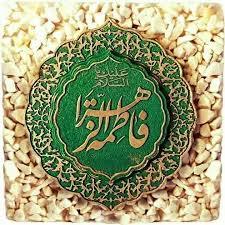
0 notes